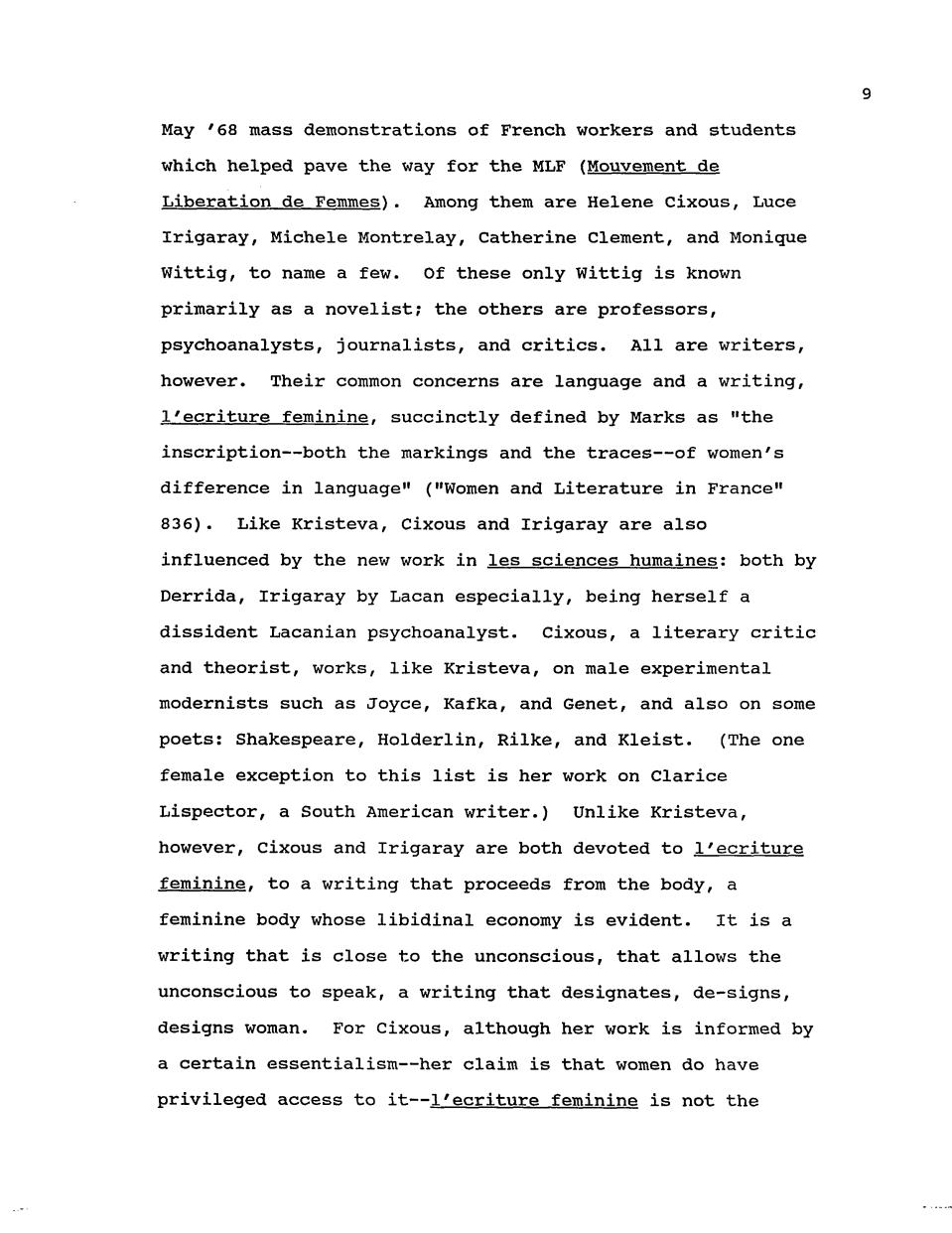
9 May /68 mass demonstrations of French workers and students which helped pave the way for the MLF (Mouvement de Liberation de Femmes).Among them are Helene cixous,Luce Irigaray,Michele Montrelay,Catherine clement,and Monique Wittig,to name a few.of these only wittig is known primarily as a novelist;the others are professors, psychoanalysts,journalists,and critics.All are writers, however.Their common concerns are language and a writing, lecriture feminine,succinctly defined by Marks as "the inscription--both the markings and the traces--of women's difference in language"("Women and Literature in France" 836).Like Kristeva,cixous and Irigaray are also influenced by the new work in les sciences humaines:both by Derrida,Irigaray by Lacan especially,being herself a dissident Lacanian psychoanalyst.cixous,a literary critic and theorist,works,like Kristeva,on male experimental modernists such as Joyce,Kafka,and Genet,and also on some poets:Shakespeare,Holderlin,Rilke,and Kleist.(The one female exception to this list is her work on clarice Lispector,a South American writer.)Unlike Kristeva, however,cixous and Irigaray are both devoted to l'ecriture feminine,to a writing that proceeds from the body,a feminine body whose libidinal economy is evident.It is a writing that is close to the unconscious,that allows the unconscious to speak,a writing that designates,de-signs, designs woman.For cixous,although her work is informed by a certain essentialism--her claim is that women do have privileged access to it--1'ecriture feminine is not the
9 May '68 mass demonstrations of French workers and students which helped pave the way for the MLF (Mouvement de Liberation de Femmes^. Among them are Helene Cixous, Luce Irigaray, Michele Montrelay, Catherine Clement, and Monique Wittig, to name a few. Of these only Wittig is known primarily as a novelist; the others are professors, psychoanalysts, journalists, and critics. All are writers, however. Their common concerns are language and a writing, l/ecriture feminine, succinctly defined by Marks as "the inscription—both the markings and the traces—of women's difference in language" ("Women and Literature in France" 836). Like Kristeva, Cixous and Irigaray are also influenced by the new work in les sciences humaines; both by Derrida, Irigaray by Lacan especially, being herself a dissident Lacanian psychoanalyst. Cixous, a literary critic and theorist, works, like Kristeva, on male experimental modernists such as Joyce, Kafka, and Genet, and also on some poets: Shakespeare, Holderlin, Rilke, and Kleist. (The one female exception to this list is her work on Clarice Lispector, a South American writer.) Unlike Kristeva, however, Cixous and Irigaray are both devoted to l'ecriture feminine, to a writing that proceeds from the body, a feminine body whose libidinal economy is evident. It is a writing that is close to the unconscious, that allows the unconscious to speak, a writing that designates, de-signs, designs woman. For Cixous, although her work is informed by a certain essentialism—her claim is that women do have privileged access to it—l'ecriture feminine is not the
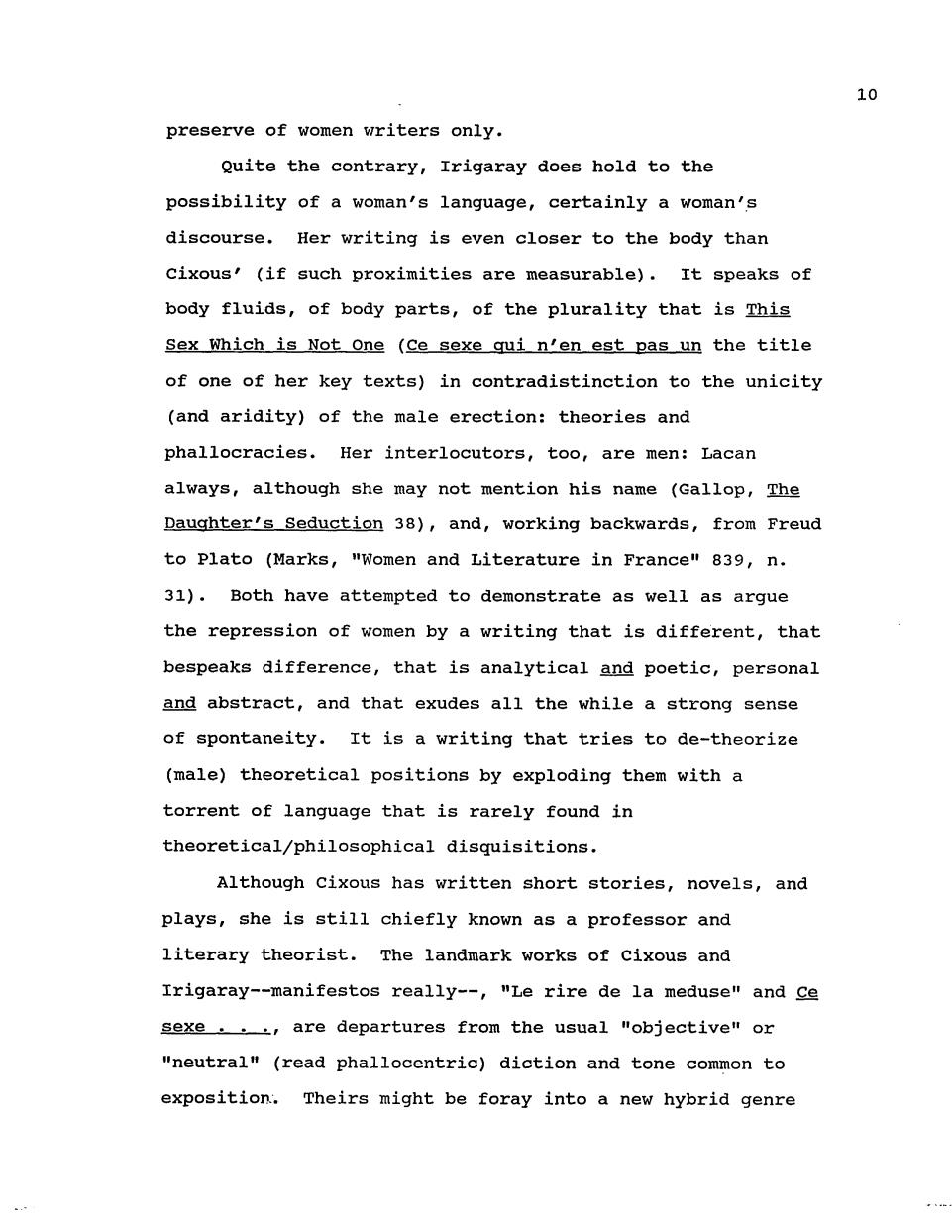
10 preserve of women writers only. Quite the contrary,Irigaray does hold to the possibility of a woman's language,certainly a woman's discourse.Her writing is even closer to the body than cixous'(if such proximities are measurable).It speaks of body fluids,of body parts,of the plurality that is This Sex Which is Not one (Ce sexe qui n'en est pas un the title of one of her key texts)in contradistinction to the unicity (and aridity)of the male erection:theories and phallocracies.Her interlocutors,too,are men:Lacan always,although she may not mention his name (Gallop,The Daughter's Seduction 38),and,working backwards,from Freud to Plato (Marks,"Women and Literature in France"839,n. 31).Both have attempted to demonstrate as well as argue the repression of women by a writing that is different,that bespeaks difference,that is analytical and poetic,personal and abstract,and that exudes all the while a strong sense of spontaneity.It is a writing that tries to de-theorize (male)theoretical positions by exploding them with a torrent of language that is rarely found in theoretical/philosophical disquisitions. Although cixous has written short stories,novels,and plays,she is still chiefly known as a professor and literary theorist.The landmark works of cixous and Irigaray--manifestos really--,"Le rire de la meduse"and ce sexe.-.,are departures from the usual "objective"or "neutral"(read phallocentric)diction and tone common to exposition.Theirs might be foray into a new hybrid genre
preserve of women writers only. Quite the contrary, Irigaray does hold to the possibility of a woman's language, certainly a woman's discourse. Her writing is even closer to the body than Cixous' (if such proximities are measurable). It speaks of body fluids, of body parts, of the plurality that is This Sex Which is Not One (Ce sexe qui n'en est pas un the title of one of her key texts) in contradistinction to the unicity (and aridity) of the male erection: theories and phallocracies. Her interlocutors, too, are men: Lacan always, although she may not mention his name (Gallop, The Daughter's Seduction 38), and, working backwards, from Freud to Plato (Marks, "Women and Literature in France" 83 9, n. 31). Both have attempted to demonstrate as well as argue the repression of women by a writing that is different, that bespeaks difference, that is analytical and poetic, personal and abstract, and that exudes all the while a strong sense of spontaneity. It is a writing that tries to de-theorize (male) theoretical positions by exploding them with a torrent of language that is rarely found in theoretical/philosophical disquisitions. Although Cixous has written short stories, novels, and plays, she is still chiefly known as a professor and literary theorist. The landmark works of Cixous and Irigaray—manifestos really—, "Le rire de la meduse" and Ce sexe . . .. are departures from the usual "objective" or "neutral" (read phallocentric) diction and tone common to exposition. Theirs might be foray into a new hybrid genre
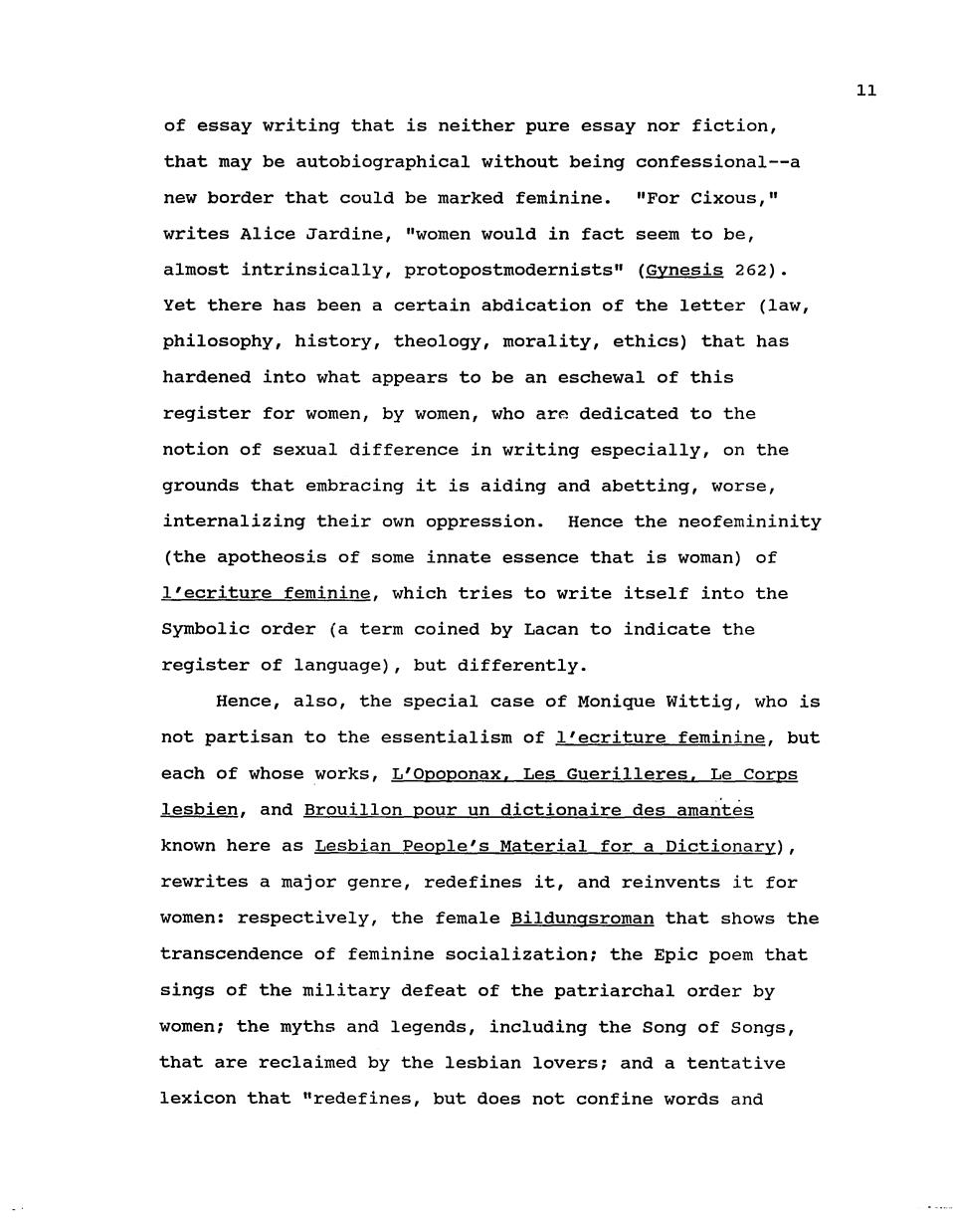
11 of essay writing that is neither pure essay nor fiction, that may be autobiographical without being confessional--a new border that could be marked feminine."For cixous," writes Alice Jardine,"women would in fact seem to be, almost intrinsically,protopostmodernists"(Gynesis 262). Yet there has been a certain abdication of the letter (law, philosophy,history,theology,morality,ethics)that has hardened into what appears to be an eschewal of this register for women,by women,who are dedicated to the notion of sexual difference in writing especially,on the grounds that embracing it is aiding and abetting,worse, internalizing their own oppression.Hence the neofemininity (the apotheosis of some innate essence that is woman)of lecriture feminine,which tries to write itself into the Symbolic order (a term coined by Lacan to indicate the register of language),but differently. Hence,also,the special case of Monique wittig,who is not partisan to the essentialism of l'ecriture feminine,but each of whose works,L'Opoponax,Les Guerilleres,Le Corps lesbien,and Brouillon pour un dictionaire des amantes known here as Lesbian People's Material for a Dictionary), rewrites a major genre,redefines it,and reinvents it for women:respectively,the female Bildungsroman that shows the transcendence of feminine socialization;the Epic poem that sings of the military defeat of the patriarchal order by women;the myths and legends,including the Song of Songs, that are reclaimed by the lesbian lovers;and a tentative lexicon that "redefines,but does not confine words and
of essay writing that is neither pure essay nor fiction, that may be autobiographical without being confessional—a new border that could be marked feminine. "For Cixous," writes Alice Jardine, "women would in fact seem to be, almost intrinsically, protopostmodernists" (Gvnesis 262). Yet there has been a certain abdication of the letter (law, philosophy, history, theology, morality, ethics) that has hardened into what appears to be an eschewal of this register for women, by women, who aro. dedicated to the notion of sexual difference in writing especially, on the grounds that embracing it is aiding and abetting, worse, internalizing their own oppression. Hence the neofemininity (the apotheosis of some innate essence that is woman) of l/ecriture feminine, which tries to write itself into the Symbolic order (a term coined by Lacan to indicate the register of language), but differently. Hence, also, the special case of Monique Wittig, who is not partisan to the essentialism of l/ecriture feminine, but each of whose works, L'Opoponax. Les Guerilleres. Le Corps lesbien. and Brouillon pour un dictionaire des amantes known here as Lesbian People's Material for a Dictionary), rewrites a major genre, redefines it, and reinvents it for women: respectively, the female Bildungsroman that shows the transcendence of feminine socialization; the Epic poem that sings of the military defeat of the patriarchal order by women; the myths and legends, including the Song of Songs, that are reclaimed by the lesbian lovers; and a tentative lexicon that "redefines, but does not confine words and
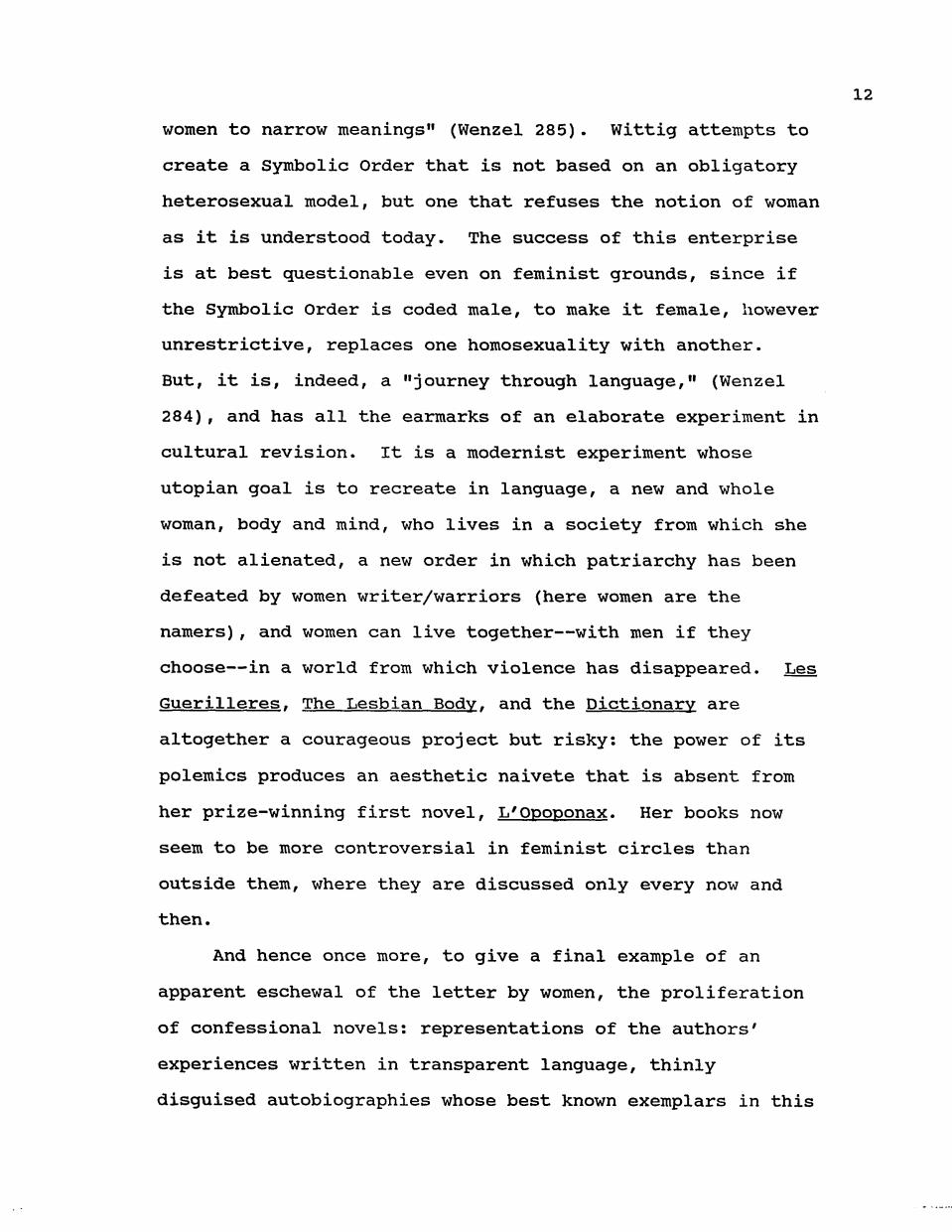
12 women to narrow meanings"(Wenzel 285).Wittig attempts to create a Symbolic order that is not based on an obligatory heterosexual model,but one that refuses the notion of woman as it is understood today.The success of this enterprise is at best questionable even on feminist grounds,since if the Symbolic order is coded male,to make it female,however unrestrictive,replaces one homosexuality with another. But,it is,indeed,a "journey through language,"(Wenzel 284),and has all the earmarks of an elaborate experiment in cultural revision.It is a modernist experiment whose utopian goal is to recreate in language,a new and whole woman,body and mind,who lives in a society from which she is not alienated,a new order in which patriarchy has been defeated by women writer/warriors (here women are the namers),and women can live together--with men if they choose--in a world from which violence has disappeared.Les Guerilleres,The Lesbian Body,and the Dictionary are altogether a courageous project but risky:the power of its polemics produces an aesthetic naivete that is absent from her prize-winning first novel,L'opoponax.Her books now seem to be more controversial in feminist circles than outside them,where they are discussed only every now and then. And hence once more,to give a final example of an apparent eschewal of the letter by women,the proliferation of confessional novels:representations of the authors' experiences written in transparent language,thinly disguised autobiographies whose best known exemplars in this
women to narrow meanings" (Wenzel 285). Wittig attempts to create a Symbolic Order that is not based on an obligatory heterosexual model, but one that refuses the notion of woman as it is understood today. The success of this enterprise is at best questionable even on feminist grounds, since if the Symbolic Order is coded male, to make it female, however unrestrictive, replaces one homosexuality with another. But, it is, indeed, a "journey through language," (Wenzel 284), and has all the earmarks of an elaborate experiment in cultural revision. It is a modernist experiment whose Utopian goal is to recreate in language, a new and whole woman, body and mind, who lives in a society from which she is not alienated, a new order in which patriarchy has been defeated by women writer/warriors (here women are the namers), and women can live together—with men if they choose—in a world from which violence has disappeared. Les Guerilleres, The Lesbian Body, and the Dictionary are altogether a courageous project but risky: the power of its polemics produces an aesthetic naivete that is absent from her prize-winning first novel, L'Qpoponax. Her books now seem to be more controversial in feminist circles than outside them, where they are discussed only every now and then. And hence once more, to give a final example of an apparent eschewal of the letter by women, the proliferation of confessional novels: representations of the authors' experiences written in transparent language, thinly disguised autobiographies whose best known exemplars in this
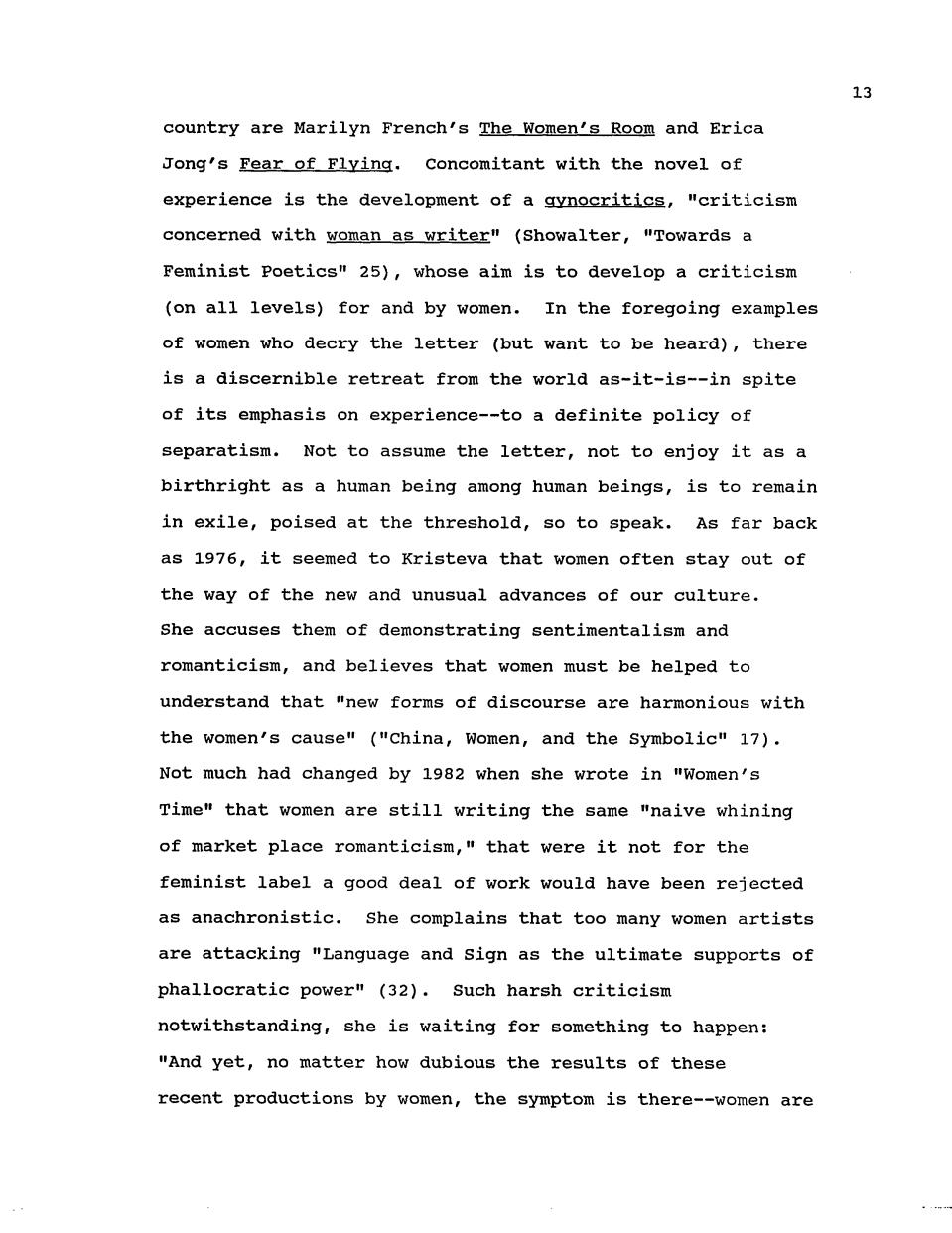
13 country are Marilyn French's The Women's Room and Erica Jong's Fear of Flying.Concomitant with the novel of experience is the development of a gynocritics,"criticism concerned with woman as writerm (Showalter,"Towards a Feminist Poetics"25),whose aim is to develop a criticism (on all levels)for and by women.In the foregoing examples of women who decry the letter (but want to be heard),there is a discernible retreat from the world as-it-is--in spite of its emphasis on experience--to a definite policy of separatism.Not to assume the letter,not to enjoy it as a birthright as a human being among human beings,is to remain in exile,poised at the threshold,so to speak.As far back as 1976,it seemed to Kristeva that women often stay out of the way of the new and unusual advances of our culture. She accuses them of demonstrating sentimentalism and romanticism,and believes that women must be helped to understand that "new forms of discourse are harmonious with the women's cause"("china,Women,and the Symbolic"17). Not much had changed by 1982 when she wrote in "Women's Time"that women are still writing the same "naive whining of market place romanticism,"that were it not for the feminist label a good deal of work would have been rejected as anachronistic.She complains that too many women artists are attacking "Language and sign as the ultimate supports of phallocratic power"(32).Such harsh criticism notwithstanding,she is waiting for something to happen: "And yet,no matter how dubious the results of these recent productions by women,the symptom is there--women are .-m
country are Marilyn French's The Women's Room and Erica Jong's Fear of Flying. Concomitant with the novel of experience is the development of a gynocritics. "criticism concerned with woman as writer" (Showalter, "Towards a Feminist Poetics" 25), whose aim is to develop a criticism (on all levels) for and by women. In the foregoing examples of women who decry the letter (but want to be heard), there is a discernible retreat from the world as-it-is—in spite of its emphasis on experience—to a definite policy of separatism. Not to assume the letter, not to enjoy it as a birthright as a human being among human beings, is to remain in exile, poised at the threshold, so to speak. As far back as 1976, it seemed to Kristeva that women often stay out of the way of the new and unusual advances of our culture. She accuses them of demonstrating sentimentalism and romanticism, and believes that women must be helped to understand that "new forms of discourse are harmonious with the women's cause" ("China, Women, and the Symbolic" 17). Not much had changed by 1982 when she wrote in "Women's Time" that women are still writing the same "naive whining of market place romanticism," that were it not for the feminist label a good deal of work would have been rejected as anachronistic. She complains that too many women artists are attacking "Language and Sign as the ultimate supports of phallocratic power" (32) . Such harsh criticism notwithstanding, she is waiting for something to happen: "And yet, no matter how dubious the results of these recent productions by women, the symptom is there—women are